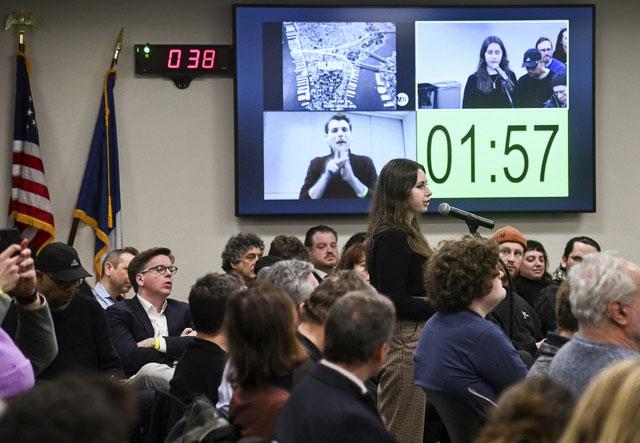According to the Hampton Jitney, its coach buses used the Queens Midtown Tunnel about 20,000 times in 2023 as part of its usual South Fork-to-New York service. Each time they did so, the toll was $41.12 — but when the Metropolitan Transportation Authority's congestion toll goes into effect as proposed later this year, that will increase by nearly 30 percent, up to $53.12 per tunnel crossing.
Multiply that by tens of thousands of trips, and it adds up to a challenge for the coach bus company even as the M.T.A. seeks to reduce congestion, improve safety, and begin mitigating the environmental impact of the volume of traffic flowing in and out of the borough.
The planned toll structure, which applies to all vehicles entering Manhattan's central business district at 60th Street and below (excepting certain streets like the F.D.R. Drive and West Side Highway), includes exemptions that will be established for buses that operate with municipal contracts — which the Hampton Jitney lacks.
"Hampton Jitney, as well as its other branded scheduled services, has always operated independently without any contract, making a toll exemption for our services ambiguous at best," Geoffrey Lynch, president of Hampton Jitney, wrote in an email to customers on Friday. "If we are not exempted from the congestion toll program, our toll expenses will increase substantially. . . . Even though we do not have a municipal contract for our services, we serve a vital role for hundreds of thousands of commuters traveling between New York City and the East End of Long Island."
In a November 2023 executive summary, the M.T.A.'s Traffic Mobility Review Board said that as many as 900,000 people enter the central business district in vehicles each day, a level that stalls the speed of travel to an average of 7 miles per hour. "The broader impact of congestion is commensurately huge — measured in higher air and noise pollution levels, lost productivity, increased emergency response times, and an eroded quality of life," the traffic mobility review board said.
"It doesn't have to be this way," the board continued. "While major cities in other countries have successfully implemented congestion pricing, U.S. cities have lagged behind, adopting partial measures that yield low results. It is time to do better."
The New York Times reported in December that Stockholm saw a 22-percent reduction in vehicles entering the city in 2006, the year congestion tolling went into effect there. It was made permanent a year later by a public referendum, and since then, it has "raised millions of dollars for building roads and highways, expanding the subway system, and making other investments in public transit," The Times wrote.
As proposed, the congestion pricing plan would establish a base EZ Pass rate of $15 for vehicles including sedans, minivans, sport-utility vehicles, pickup trucks, and small vans. "Small trucks" would pay $24, and "large trucks" $36. It would only be charged once per day. "Charging drivers as they enter," the review board said, is "the best way to influence travel behavior."
Taxis and ride-sharing vehicles, which are "a significant cause of congestion," the review board said, would pay a reduced rate of $1.25 to $2.50 per entry. A 2018 survey found that as many as half the vehicles in the central business district fall into this category. Low-income drivers, defined as those with a federally adjusted income of up to $50,000 or those receiving public benefits such as SNAP or WIC, are also eligible for discounts. Emergency vehicles and those transporting disabled passengers would be exempt.
The entry toll would be structured to avoid "an additional potential hardship for those who work overnight on non-consecutive days." It would be applied to travel between 5 a.m. and 9 p.m. on weekdays and 9 a.m. and 9 p.m. on weekends.
The M.T.A. heard from nearly 400 people over the course of four public hearings on the plan, one last Thursday, one on Friday, and one Monday. A Hampton Jitney representative attended to share comments from the company's point of view, according to Aaron Donovan, the M.T.A.'s deputy communications director.
"Those are part of the record that will be reviewed by M.T.A. board members along with the written comments," which will be accepted through the end of the day on Monday, Mr. Donovan said in an email.
The hearings were recorded and can be accessed on the M.T.A.'s YouTube channel.
Hampton Jitney representatives did not respond to emailed questions by press time yesterday. Its email on Friday contained a direct link to the M.T.A.'s online portal for comments, which can also be submitted by emailing [email protected], by writing to the attention of "C.B.D. Tolling Program" at 2 Broadway, 23rd Floor, New York 10004, or by calling 646-252-7440.
"Our intention is to continue advocating for an exemption from the congestion toll program and we are asking for help from our ridership," Mr. Lynch wrote on Friday. "If you ride Hampton Jitney, Hampton Ambassador, or Hampton Luxury Liner, we need your support."




